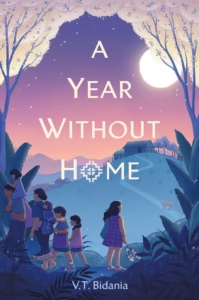A Year Without Home
V. T. Bidania
Nancy Paulsen Books
Published January 13, 2026
Amazon | Bookshop | Goodreads
About A Year Without Home
A poignant middle grade novel in verse about a Hmong girl losing and finding home in the aftermath of the Vietnam War. For fans of Jasmine Warga and Veera Hiranandani.
For eleven-year-old Gao Sheng, home is the lush, humid jungles and highlands of Laos. Home is where she can roll down the grassy hill with her younger siblings after her chores, walk to school, and pick ripe peaches from her family’s trees.
But home becomes impossible to hold onto when U.S. troops pull out of the Vietnam War. The communists will be searching for any American allies, like Gao Sheng’s father, a Hmong captain in the Royal Lao Army who fought alongside the Americans against the Vietnamese. If he’s caught, he’ll be killed.
As the adults frantically make plans – contacting family, preparing a route, and bundling up their silver and gold, Gao Sheng wonders if she will ever return to her beloved Laos and what’s to become of her family now. Gao Sheng only knows that a good daughter doesn’t ask questions or complain. A good daughter doesn’t let her family down. Even though sometimes, she wishes she could be just a kid rolling down a grassy hill again.
On foot, by taxi and finally in a canoe, Gao Sheng and her family make haste from the mountains to the capitol Vientiane and across the rushing Mekong River, to finally arrive at an overcrowded refugee camp in Thailand. As a year passes at the camp, Gao Sheng discovers how to rebuild home no matter where she is and finally find her voice.
Inspired by author V.T. Bidania’s family history, A Year Without a Home illuminates the long, difficult journey that many Hmong refugees faced after the Vietnam War.
My Review
My knowledge of the Vietnam War is pretty thin, so learning about the Hmong soldiers from Laos who helped the American forces was new to me. The story includes some of what happened in Laos in and around 1975, especially for the Hmong people, such as Gao Sheng and her family.
I love that the author showed Gao Sheng’s frustration with her family role. (As the oldest daughter, her job is to take care of the younger siblings and cousins, whereas her brother is allowed more unstructured play time. Her feelings were easy to understand, and I think they’ll resonate with young readers today as well. I also thought it was cool that she learned embroidery and felt a connection to her mom and aunties through that activity. It captured that in-between feeling of adolescence, where sometimes she wanted to be a kid and other times she wanted to do things considered more adult.
At the end of the book, the author shares her personal connection to the story. Her family had an experience similar to Gao Sheng’s when she was a baby. I liked how she incorporated her family’s history into the story.
A Year Without Home reminded me a little bit of Inside Out and Back Again by Thanhha Lai. I think readers who enjoy realistic fiction in verse will like this one.
Content Notes
Recommended for Ages 8 to 12.
Profanity/Crude Language Content
None.
Romance/Sexual Content
Reference to cultural norms. A boy wants to speak with Gao Sheng, but it isn’t proper for them to speak directly, so his cousin passes the message to her.
Spiritual Content
None.
Violent Content
Gao Sheng hears rumors that people have been arrested and possibly tortured. In the refugee camp, her family hears stories of people who died in the airport bombing. Some families were robbed as they tried to escape Laos.
Drug Content
None.
Note: This post contains affiliate links, which do not cost you anything to use but help support this blog. I received a free copy of this book in exchange for my honest review. All opinions are my own.
Marvelous Middle-Grade Monday
I’m sharing this post as a part of a weekly round-up of middle-grade posts called Marvelous Middle-Grade Monday. Check out other blogs with posts about middle-grade books today on Marvelous Middle-Grade Mondays at Always in the Middle.
